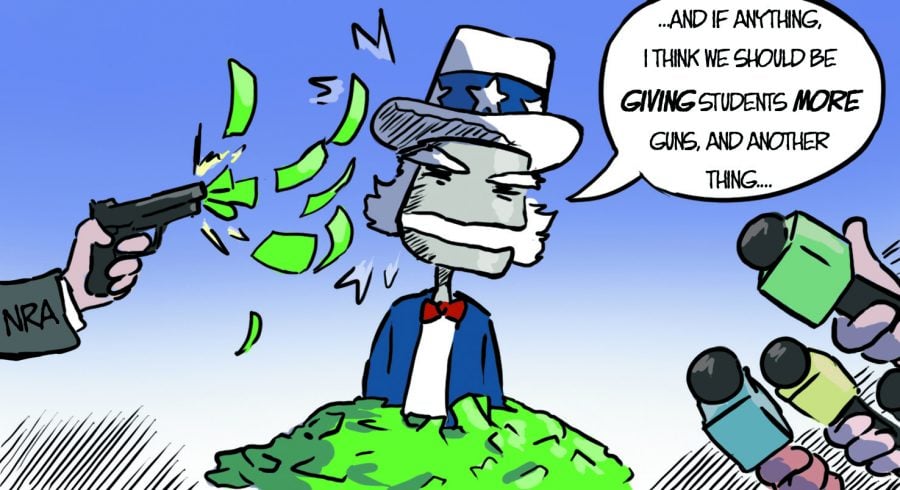NRA plays significant role in blocking legislation
“Guns don’t kill people, people kill people.”
For years the National Rifle Association has been operating under this slogan, using its political power to propel into law regulations that strengthen the rights of gun-permit holders, while blocking those that don’t. I believe the NRA is a significant part of the reason that gun control in the United States is not moving forward.
In the past decade, the NRA has been an advocate for statewide “Stand Your Ground” and open-carry laws. And now, following the early October Las Vegas shooting that left 58 people dead, the NRA is opposing legislation that would ban the use of bump stocks, which alter a semi-automatic weapon to make it fire like an automatic weapon.
If the NRA response to the Las Vegas shooting is similar to their response following the Newtown, Connecticut shooting of 2012, little will change. According to the Daily News, in 2013, the year after Newtown, donations to the NRA increased to $96.4 million, which is an 11.5 percent increase from 2012.
The result was the defeat of legislation in 2013 that would require universal background checks and implement an assault weapons ban.
But how does the NRA get its members to open up their pocketbooks and produce nearly $100 million in donations in one year?
According to Associate Academic Dean and Associate Professor of Political Science Kyle Dell, the NRA, like many lobbying groups, garners support by having an absolutist point of view on a very narrow set of issues.
“(The NRA) understands its message, and it understands how to have influence in Washington, D.C. on a narrow set of issues,” said Dell. “They sustain themselves by taking very radical positions that are very absolutist in their worldviews in a way that is just so compelling to a very few number of people.”
One example of the NRA’s absolutist worldview was at their press conference nearly a week after the Newtown shooting.
“The only thing that stops a bad guy with a gun is a good guy with a gun,” said Wayne LaPierre, executive vice president of the NRA, at the press conference in 2012. “I call on Congress today, to act immediately to appropriate whatever is necessary to put armed police officers in every single school in this nation.”
Even after the seventh-deadliest school massacre, where 20 children between the ages of six and seven were shot and killed, the NRA was unwilling to recognize the role that guns, more specifically, assault weapons, play in mass shootings.
And four days after this year’s Las Vegas massacre, the NRA released a statement which further exemplifies their one-sided perspective: “We urge Congress to pass National Right-to-Carry reciprocity, which will allow law-abiding Americans to defend themselves and their families from acts of violence.”
Besides the NRA’s absolutist stance on gun control, Maria Rosales, associate professor of political science, believes that the NRA relies on fearmongering to relay their message. I agree with Rosales wholeheartedly.
“(The NRA does) a lot of fearmongering, and they do a lot of what seems to me pretty (obvious) white supremacist advertisements,” said Rosales.
But how can we pass gun control legislation despite the significant influence of the NRA?
Regardless of my dislike of the NRA, their tactics and their blockage of what is, in my opinion, beneficial and progressive gun control legislation, I recognize that the organization does fall within the realm of the First Amendment.
Even though I don’t think that so much private money should be influencing government decisions, I know that all lobbyist organizations use their funds to promote their own agendas. And the solution to gun violence in the United States is certainly not to disband all lobbyist groups.
We as a nation need to rethink our priorities involving guns and come to a consensus as to how we can prevent mass shootings and other forms of gun violence as we move forward.
Current gun laws that vary by state prohibit a cohesive national policy.
“(We need) to have a kind of national consensus … when it comes to implementation for (gun control policy), to … reflect the needs of a community, because these are the people for whom the problems have the greatest impact,” said Dell.
I believe Dell is correct. We need to have general national guidelines for gun control that can be interpreted at the state level to adapt to the guns and restrictions already present in the state and the use of guns in the economy.
Gun control is a must as the United States moves forward.










Eagle275 • Oct 28, 2017 at 4:08 pm
We have the 2nd Amendment because of people like the writer of this article eh.
Eagle275 • Oct 28, 2017 at 4:08 pm
We have the 22nd Amendment because of people like the writer of this article eh.
Eagle275 • Oct 28, 2017 at 4:09 pm
2nd Amendment my bad
Pat Orsban • Oct 28, 2017 at 8:24 am
Liberals hate right protections groups that interfere with their efforts to disarm more victims, violate more law abiding citizens, protect criminals (like Harvey Weinstein and Slick Willy) all to “save the children”.
The NRA answers to it’s members. Not corrupt liberals who hate gun owners.